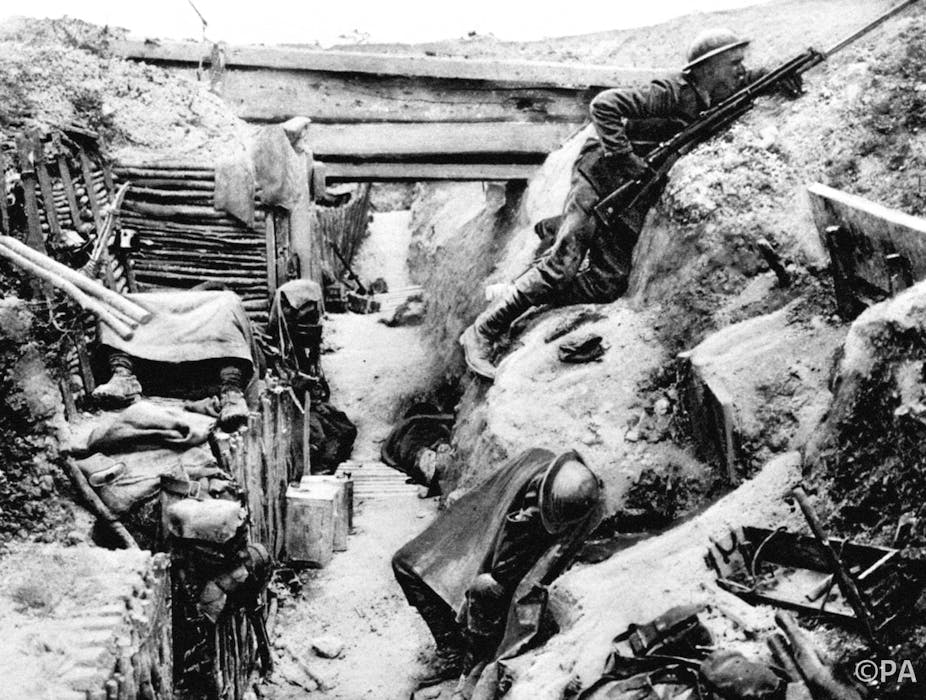The anniversary of Armistice Day is chance to reflect on a shameful chapter in the history of journalism. Millions were killed and maimed during World War I, about a million from Britain and its empire alone. The mechanisation of war made possible killing on a scale never foreseen. Today, some stretches of trench and craters from explosions still remain, scars on land which once was battlefield. They help us to imagine the soldiers’ lives: terror, boredom, discomfort, despair.
What a challenge, what an opportunity this conflict was for journalists – a challenge, alas, to which they largely proved unequal. As Philip Knightley concludes in his excellent The First Casualty:
More deliberate lies were told than in any other period of history, and the whole apparatus of the state went into action to suppress the truth.
The state censored; correspondents frequently cooperated.
Now, as the centenary of the start of the war draws near, it is the war’s poets, and not its reporters, whose writing is remembered. There must have been some uneasy encounters. In “Editorial Impressions”, Siegfried Sassoon shows us a correspondent recounting the “glorious time he’d had/While visiting the trenches.” The reporter rabbits on before a wounded soldier’s bitter words end the poem, “Ah, yes, but it’s the Press that leads the way.”
Chequered history
The history of the reporting of conflict is not a story of steady and certain progress. Much of the journalism from the First World War failed to match the standard set by William Howard Russell’s dispatches from the Crimea more than half a century before.
Russell’s account of the Charge of the Light Brigade is unlikely ever to replace Tennyson’s evocation of the “Valley of Death” in the popular imagination, but his description of the aftermath of a later action in the Crimea campaign is incomparably hard-hitting in its eyewitness realism:

It was agonising to see the wounded men who were lying there under a broiling sun, parched with excruciating thirst, racked with fever, and agonized with pain – to behold them waving their caps faintly, or making signals towards our lines, over which they could see the white flag waving.
The reader can almost feel the dying soldiers’ blinding headaches.
After the failures of the First World War, journalism’s reputation was restored in the Second by reporters such as Richard Dimbleby, Ed Murrow, and Vassily Grossman. Michael Herr’s Dispatches, written about his experiences in Vietnam, combines reportage with literary style. It still packs a punch and remarkable freshness almost 40 years after publication.
The Second World War also inspired the poetry of Keith Douglas – even though one of his most memorable works, “I listen to the desert wind”, takes as its theme desolation and heartbreak, rather than soldiering. Before being killed in Normandy in 1944, Douglas had fought in the Middle East. The region was a battleground in both World Wars – and, in Syria and Iraq, has been much more recently.
Dangerous assignment
From 2002-2004, I was the BBC’s correspondent in Gaza. In December 2003, I travelled to Iraq for a reporting assignment. A couple of weeks before I left, there was due to be a Remembrance Service in one of Gaza’s two Commonwealth War Cemeteries, the final resting places of soldiers engaged in a campaign against Ottoman forces in the First World War.
That year, as the second Palestinian intifada – or uprising against Israel – wore on, the ceremony was cancelled. It was too dangerous. I remember, on a later visit to one of the cemeteries, finding gravestones chipped by recent bullets.

In Iraq, officially at least, I encountered optimism among the occupying powers. While I was there, Saddam Hussein was captured. I thought then of Siegfried Sassoon’s character, a “gross, goggle-eyed” father, whose “eldest lad/Writes cheery letters from Baghdad.” I wondered if another father, perhaps somewhere in the shires, was now saying something similar some 90 years later.
If he was, it was premature. Ten years on, there are far fewer people who think the invasion was wise. The Iraq War produced some memorable war reporting, especially once the insurgency began in 2004. The coverage of the run up to the invasion was less creditable. The New York Times was just one of the news organisations which “fell for misinformation”; at least they had the courage to admit it.
Where will future generations look for their first-hand accounts of that conflict - to reporters’ dispatches, or to writers’ poetry and prose? Perhaps to Kevin Powers’ The Yellow Birds, widely praised on publication last year.
Powers himself addressed the journalism or fiction issue in an interview with Jonathan Ruppin of Foyle’s bookshop. His answer was that fiction worked “in a different way,” and, he concluded, “The work that journalists do during wartime is utterly essential and, to me, incomprehensibly difficult.”
“Essential” and “difficult”: words to describe any great writing about war - be it journalism or literature.

